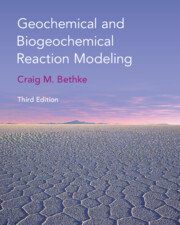Book contents
- Frontmatter
- Dedication
- Contents
- Preface
- Preface to Second Edition
- Preface to First Edition
- A Note About Software
- 1 Introduction
- 2 Modeling Overview
- PART I EQUILIBRIUM IN NATURAL WATERS
- PART II REACTION PROCESSES
- PART III APPLIED REACTION MODELING
- 26 Hydrothermal Fluids
- 27 Geothermometry
- 28 Evaporation
- 29 Sediment Diagenesis
- 30 Kinetics ofWater–Rock Interaction
- 31 Weathering
- 32 Oxidation and Reduction
- 33 Waste InjectionWells
- 34 Petroleum Reservoirs
- 35 Acid Drainage
- 36 Contamination and Remediation
- 37 Microbial Communities
- Appendix A Sources of Modeling Software
- Appendix B Evaluating the HMW Activity Model
- Appendix C Minerals in the LLNL Database
- Appendix D Nonlinear Rate Laws
- References
- Index
34 - Petroleum Reservoirs
from PART III - APPLIED REACTION MODELING
Published online by Cambridge University Press: 09 December 2021
- Frontmatter
- Dedication
- Contents
- Preface
- Preface to Second Edition
- Preface to First Edition
- A Note About Software
- 1 Introduction
- 2 Modeling Overview
- PART I EQUILIBRIUM IN NATURAL WATERS
- PART II REACTION PROCESSES
- PART III APPLIED REACTION MODELING
- 26 Hydrothermal Fluids
- 27 Geothermometry
- 28 Evaporation
- 29 Sediment Diagenesis
- 30 Kinetics ofWater–Rock Interaction
- 31 Weathering
- 32 Oxidation and Reduction
- 33 Waste InjectionWells
- 34 Petroleum Reservoirs
- 35 Acid Drainage
- 36 Contamination and Remediation
- 37 Microbial Communities
- Appendix A Sources of Modeling Software
- Appendix B Evaluating the HMW Activity Model
- Appendix C Minerals in the LLNL Database
- Appendix D Nonlinear Rate Laws
- References
- Index
Summary
In efforts to increase and extend production from oil and gas fields, as well as to keep wells operational, petroleum engineers pump a wide variety of fluids into the subsurface. In this chapter we consider how multicomponent chemical reaction analysis can be used to foresee unfavorable consequences of reservoir flooding. We take up two examples, sulfate scaling in North Sea oil fields and the alkali flooding of a hypothetical clastic reservoir.
Keywords
- Type
- Chapter
- Information
- Geochemical and Biogeochemical Reaction Modeling , pp. 409 - 420Publisher: Cambridge University PressPrint publication year: 2022

